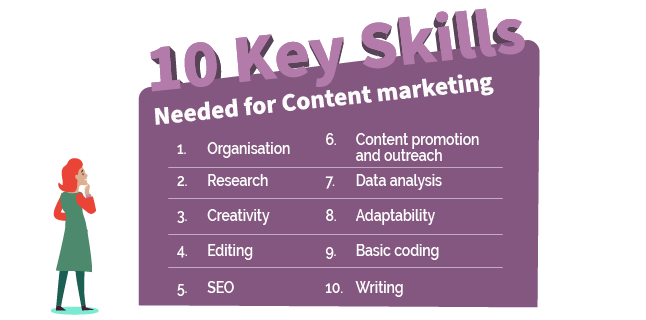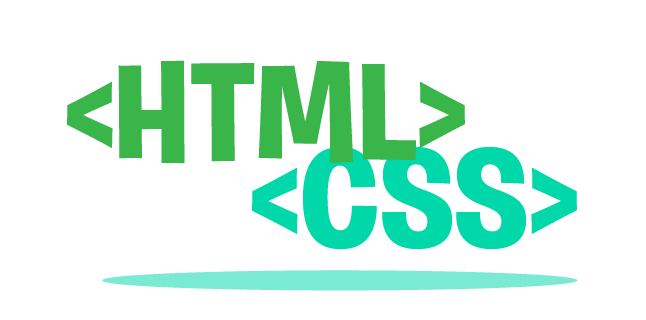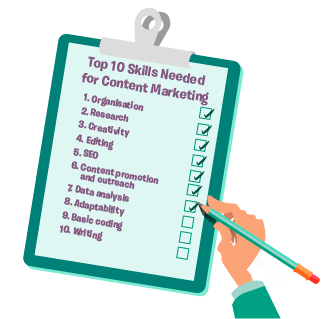There are many skills needed for content marketing and it’s important to familiarise yourself with them. This is because content marketing is one of the most effective strategies available to brands right now.
In fact, research suggests that content marketing can produce 3 times more leads and costs 62% less than traditional marketing methods.
The demand from consumers for reliable, accurate and helpful information has opened up opportunities for brands.
This has enabled them to reach larger audiences and forge trusting relationships like never before. As a result, lead generation is a lot easier than it used to be.
Considering this, it’s no surprise 91% of B2B and 86% of B2C marketers dedicate their time and resources to it.
Though, with more brands discovering the power of content marketing, the digital sphere is becoming increasingly concentrated. Making it much harder for brands to stand out to their audiences.
If you want to break through the competition, you need to be the best. You need to produce the most engaging, entertaining and most importantly, relevant content.
And this of course all requires a specific set of skills.
There are 10 key skills needed for content marketing which you and your team will need to familiarise yourself with.
They’re crucial if you ever want to have success with your content marketing strategy. Each is critical to creating and deploying this new marketing avenue.
10 Key Skills Needed for Content Marketing

If you want to have success, you need to focus on improving these 10 skills needed for content marketing.
1. Organisation
What lies at the core of every great content plan is organisation.
In fact, the creation of a content marketing strategy requires the greatest amount of planning. To create an effective strategy, marketers need to plan for an end goal and discover their audience’s needs. Then, they need to match pieces of content to those needs, in line with their end goal.
Achieving success with content marketing requires a lot of careful planning. This way you can ensure you are consistently producing high quality, engaging material.
Consistency is key when it comes to content. Whether you publish blog posts every day or once per week, it’s crucial for you to adopt a schedule. When you don’t, or you’re not consistent in your posting, you can confuse your visitors. Keeping it consistent not only improves that user experience, but also adds to your credibility and reputation as a brand.
Using organisational tools like Trello and Asana can help marketers to plan ahead. They can help you to set deadlines for content, collaborate with team members, and share any updates on projects. All in all, these are great ways to plan your content ahead and ensure you’re never falling behind deadlines.
2. Research
Another of the skills needed for content marketing is research. Research skills are critical to your entire content marketing strategy. As such, you’ll need to adapt and use your research skills interchangeably, depending on each stage of your strategy.

For example, the first step in creating any content strategy requires a detailed competition analysis. This is where you need to find, scan and analyse your website in relation to those directly above and below your rankings on Google.
A detailed competition analysis will present endless insights for which to base your strategy on. Such as, working out how much work you’ll need to put in to try and outrank your competitors. Or understanding what others have done to make their content a success.
You may even find areas in your industry that they haven’t touched upon. As a result, these areas could create easy wins for your own brand if you produce content around them.
Conducting audience and keyword research
The second part of your content strategy involves in-depth audience and keyword research. This will provide you with valuable insights required to understand their needs. As well as the type of content you should be creating to address those needs.
But you’ll also know exactly what words and phrases to include within your copy that will make it more discoverable.
The third and final part of your research comes down to the production of your content. Any piece of high-quality content will have been carefully planned and researched. It should be backed by studies, surveys, case studies and relevant news topics.
When you have content which has been properly researched and informed by accurate sources, everybody wins. It presents more opportunities for marketers, and a better experience for site visitors. Visitors who will enjoy reading quality, detailed and insightful material.
3. Creativity

Even though this may seem like an obvious point, another of the key skills needed for content marketing is creativity.
Surprisingly, very few content marketers create content that is engaging enough to achieve great results for their brand.
With more companies turning to content marketing as a way to drive traffic, marketers increasingly need to be more creative. They need to find new angles, opinions or unique ways to present content. Ultimately, their content needs to stand out against their competitors offerings.
Content doesn’t just come in one format: blogs. Content can take almost any form, videos, quizzes, podcasts, infographics, photos, and even e-books. In fact, over recent years, visual content has gained popularity, with 54% of consumers expecting brands to share video content.
The greatest marketers will dedicate time to brainstorm new ideas. They will experiment with new forms of content. And play around with their tone and style to best suit their audience.
Remember, the best content is the one which best engages your audience and offers the most relevant information. No matter how creative you want to get, always keep your audience’s interests at the heart of everything you publish.
4. Editing
Every piece of content needs to be polished and scanned through with a fine-tooth comb before it can be published. That’s why editing is one of the main skills needed for content marketing.
Good editing skills are the only way you can ensure your content is clear of any imperfections. And, most importantly, ensure it conveys your message to your audience in the most clear and engaging way possible.
If you have a big budget, you can hire a professional editor to check through your content. However, for those on a small budget, you’ll need to train yourself and your team to embed editing into your daily routine.

Whether it’s a blog post which needs the grammatical blunders checking through.Or an image which needs photoshopping or cropping. Or even video footage which needs cutting together. Whatever the content is, editing ensures it is the highest quality it can possibly be.
It’s a good idea to distribute your content amongst your team, or at least have one other person look over it. A fresh pair of eyes will be able to scan for any easy-to-miss mistakes. They can also look through it objectively to see if you’ve conveyed the intended message in an engaging way.
Even the greatest and most established content creators will very rarely produce perfect content on their first try. So, you need to learn to ingrain this stage into every piece of content you produce. Working on your editing skills is necessary in order to make sure your content is the best it can be.
5. SEO
Search engines are the place where searchers will enter their queries and discover your content.
But, for your content to be discoverable, it needs to be properly optimised for search engines. This is so they can scan, understand and rank your pages according to their relevance to the searcher’s query. This process is called search engine optimisation (SEO).
Content marketing and SEO go hand-in-hand, and you need to have a good understanding of both for a successful strategy.
Gone are the days where you could pepper a few relevant keywords within your pages for them to rank well. Today, there are over 200 factors which affect your rankings, and these are of course always changing.
So, you need to ensure you have an understanding of some of the most important on-page ranking factors. This is in order to optimise your content to be read by search engines.
Don't forget about off-page SEO
What many content marketers also forget is that off-page SEO also has a huge impact on your rankings. In fact, it’s just as important as the content which is on your page.
Therefore, if you want your content to rank highly on Google. Or reach those most interested in seeing it, you need to understand both.
Even if you’re using an external consultant to help guide and review your content, it’s a good idea to have an understanding of SEO for yourself. That way you can make guided decisions and understand how to make your material more accessible. Not only for searchers, but for search engines too.
6. Content Promotion & Outreach
Another of the key skills needed for content marketing is promotion and outreach.
It’s all well and good creating content, but you need to promote it if you want people to discover it.
If you’re new to content marketing, it’s unlikely that you have the web presence or following needed for your content to promote itself. So, you need to ensure you have promotional skills to share your new material with as many people as possible.

According to the experts, you should spend 20% of your time creating content, and 80% promoting it. Even if you disagree with this statistic, it’s obvious that content promotion is a hugely important process in content marketing. After all, it doesn’t matter how great your content is if nobody is actually looking at it.
Just like your content creation, your promotional skill involves understanding what your audience is interested in and when. And then, distributing the most relevant piece of content to them.
You’ll also need to spend some time working out what types of call-to-actions (CTAs) they best respond to. As well as evaluating which of these CTAs drives the most click-through rates for your brand.
Some of the most common ways to promote your content include your social media, emails and amongst blogging communities. But you’ll also want to outreach your work to influencers and other bloggers who can promote your content. Or alternatively, use it for guest post opportunities.
This is a great way to build your backlinks and improve your SEO, making your pages even more discoverable!
Spend the time refining your promotional and outreach skills and you’ll find it easier to create and promote successful content in the future.
7. Data Analysis
To grasp the impact of your content marketing, the ability to understand and analyse its performance via data is essential.
When you first create your strategy, you’ll have set out an end goal which your content sets out to achieve. For instance, you may want to increase your site traffic by X% or improve your lead acquisition by X%.
One of the most common tools businesses use to track and measure their goals is Google Analytics. It’s a free tool for websites which offers thousands of different metrics and snippets of data.
This data spans every aspect of your site. Including your pageviews, bounce rates, time spent on page, and even the source of where your audience has come from. Whatever metric you need to measure your goal, it’s likely you’ll be able to find it on Google Analytics.
Understanding your data
However, although it’s great to have access to all of this data and information, it’s only useful if you can interpret it. It’s only useful to you if it gives you a direct answer to something. If it doesn’t, this is simply known as a vanity metric.
For example, your page views are great at showing how many people are coming to a particular page. But, unless you use it in conjunction with another metric, such as time spent on page, it’s not helpful.
Page views alone can’t show you whether your site visitors are sticking around to read and engage with your content. Which makes page views on their own pretty pointless.
Therefore, you need to develop your data analysis skill. Consider taking the Google Analytics training course to best understand and interpret the data which surrounds your content. That way, you can see if it’s helping to achieve the goals you first set out for it to achieve.
8. Adaptability

The online world moves pretty fast.
Ground-breaking news can turn stagnant within a few days. And viral social media posts lose traction within a matter of hours. Most new consumer trends come and go faster than a speeding bullet.
For marketers, this means you need to be prepared to constantly review your content strategy. You’ll need to adapt it regularly to suit the changing marketplace.
As an example, there’s no point being an online clothing store that talks about the trendiest pink trainers if the hottest trend on the market is black trainers.
This is why adaptability is among the key skills needed for content marketing.
You need to continually review your keyword research to make sure your content plan is ahead of the curve. This way you can ascertain whether you can offer information to the consumers before it becomes too late.
If you don’t, you’re going to be creating content that no one’s searching for. Therefore you’ll be creating content that has little to no impact on your website.
It’s not just about adapting your content
In addition to the content you’re sharing, you need to be adaptable to changing your strategy. Especially when it comes to any algorithm changes which could affect your content’s ability to rank well.
Did you know that every day, there’s an average of almost 9 changes per day to Google’s ranking algorithm?
This means to be successful with your content marketing strategy, you need to be able to keep up-to-date. Regularly read up on the latest updates so you are aware of what factors will affect your rankings.
Being adaptable is an essential trait for any marketer. If you don’t like change, then it’s the wrong marketing avenue for you. But, if you enjoy learning new things and are always curious, you’ll have an advantage over your competitors.
Continue to develop by learning a new skill or taking on a new project each month. It’s a great way to keep your brain in the motion of constantly evolving and learning new things.
9. Basic Coding

Many marketers set out on their content marketing journey with little to no understanding of basic code. But understanding basic HTML and CSS coding can save a lot of time and pain for your website development team.
Learning basic commands can help to quickly resolve minor issues. It means you can make simple changes to your blog or website to better display your content.
It will also help you to make minor technical changes to your website’s technical SEO. Which can be easy wins in terms of improving your rankings and helping your content to reach more people.
For instance, you may be able to improve your page loading speeds by minifying the code on your page. Or you could embed your image file names into the website’s code to make them readable by search engines.
Most content management systems like WordPress will be able to automate a lot of these processes. However, it’s always good to have this knowledge in case of any unforeseen errors or technical difficulties.
10. Writing

Though you are likely to be managing other writers, being able to write well is important. You don’t need to be Shakespeare but developing the writing skills needed for content marketing is essential.
As I mentioned earlier, there are lots of types of content marketing, and you should experiment with all the different formats to see which best connects with your audience.
However, a lot of websites still depend on great written content to take the lead on their strategy. And, if you want your business and content to be taken seriously, you’ve got to develop great writing skills. Things like bad spelling and grammar can damage your reputation and your rankings.
In fact, in a poll of over 1000 UK adults, a translation and communications company called Global Lingo discovered that 74% of searchers paid close attention to the quality of grammar on a brand’s website. And a huge 59% agreed that they wouldn’t deal with a company that has an obvious mistake within their copy.
Even if you yourself aren’t the greatest copywriter, you should be investing in people who are. A great writer has the ability to capture your audience’s attention within the first few sentences. They can convey your messaging in the most digestible and engaging way possible. And it’s this engagement which will keep driving your audience to your website and help you become more discoverable to new searchers.
Mastering your Skills for Content Marketing Success
Content marketing can be extremely powerful. If done successfully, it can produce long-term results. It drives more traffic to your site, forges connections with those visitors, and ultimately, makes them enter into the sales process with ease.
But that’s only if it’s done right.
Content marketing isn’t as simple as flooding your website with hundreds of uninformed blog posts and content pages. It’s about tapping into your market research and producing material that’s been guided by keyword research. But also, answers everything searchers are looking for in relation to your industry.
It means honing in on a variety of skills to ensure your content is high quality, engaging, and most importantly, relevant.
From research and pre-planning to promoting and analysing the data from your content; if you and your team can master these skills, your content strategy will lift you to success in no time.
Outsourcing your Content Marketing to a Marketing Consultant
Great content is what fuels effective SEO and website growth. But it’s something which takes a lot of time, planning and research to get right.
If you’re a new start-up or small business without a dedicated marketing team, you probably don’t have the time. Committing to developing your skills and implementing a content strategy that’s going to make impactful results tales time. This is where you may turn to a marketing consultant such as myself to help you with your strategy
I’ve worked in digital marketing for over a decade. During this time I’ve worked with multiple clients to increase their traffic, engagement and conversions through effective strategy.
My team and I can develop and deploy a content marketing strategy that brings your brand to life. We can engage the right audiences and create the long-term results you need. So that you can continue to grow and succeed in today’s congested marketplace.
To find out more about the services we offer and how we could work with your company, feel free to get in contact. I’d be happy to have an obligation-free chat with you to learn more about your business and talk you through some of our previous clients’ work.







